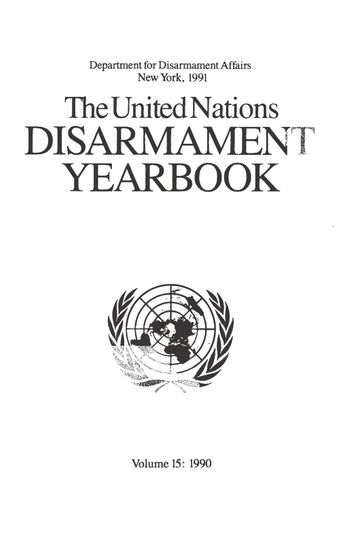Effective international arrangements to assure Non-Nuclear-Weapon states against the use or threat of use of Nuclear Weapons

- Author: United Nations Office for Disarmament Affairs
- Main Title: United Nations Disarmament Yearbook 1990 , pp 211-222
- Publication Date: December 1990
- DOI: https://doi.org/10.18356/085c4101-en
- Language: English
Thenon-nuclear-weapon States, in particular those that do not belong to a major military alliance, have long harboured feelings of insecurity and a sense of vulnerability in a world where nuclear arsenals are in the hands of a few Powers. During the negotiations on the Treaty on the Non-Proliferation of Nuclear Weapons, in 1968, they expressed their concern particularly forcefully. To assuage those misgivings, the three original nuclear-weapon States parties to the Treaty—the USSR, the United Kingdom and the United States—committed themselves to provide binding security assurances through the Security Council. Accordingly, in its resolution 255 (1968), sponsored by the three States, the Security Council recognized that aggression with nuclear weapons or the threat of such aggression against a non-nuclear-weapon State would create a situation in which the Council, and above all its nuclear-weapon States permanent members, would have to act immediately in accordance with the Charter; welcomed the intention expressed by certain States (the sponsors) that they would provide or support such immediate assistance to any non-nuclear-weapon State party to the Treaty; and reaffirmed, in the case of such aggression or threat, the inherent right, under Article 51 of the Charter, of individual or collective self-defence.
© United Nations
ISBN (PDF):
9789210579940
Book DOI:
https://doi.org/10.18356/b2bd0a2e-en
Related Subject(s):
Disarmament
Sustainable Development Goals:
-
From This Site
/content/books/9789210579940s003-c004dcterms_title,dcterms_subject,pub_keyword-contentType:Journal -contentType:Contributor -contentType:Concept -contentType:Institution105
/content/books/9789210579940s003-c004
dcterms_title,dcterms_subject,pub_keyword
-contentType:Journal -contentType:Contributor -contentType:Concept -contentType:Institution
10
5

